#something something I’m very neurodivergent so its hard to stay motivated most of the time
Explore tagged Tumblr posts
Note
Ok so you wrote the 'Ghost on the shore' thing, right? (Which is very good by the way)
I was thinking that what if the challenger tried communicating through the death cards? Like, slowly mapping out sentences telling Leshy about themselves? Idk, i just feel like there's some story opportunity there but i don't have the brain cells to write it. Maybe explaining why they never take the meat?
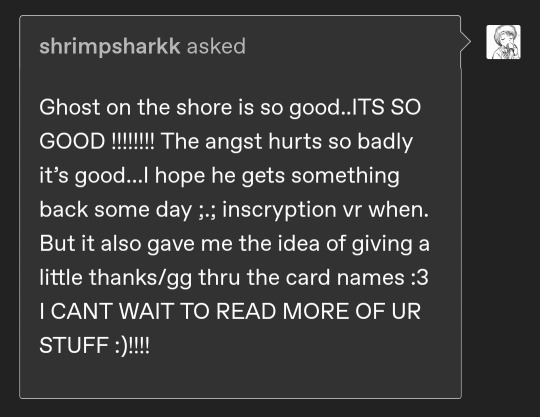
Y’all… y’all. Y’all are absolute geniuses. I hadn’t even thought of this concept when I wrote Ghost on the Shore- and honestly?? Amazing, breathtaking, spectacular.
I’m sorry if y’all wanted a real, proper fic about this concept, I’ve been having trouble with long form writing as of late, so this is just going to be more of a stream of consciousness than anything else.
Okay okay anyway anyway:
Maybe you first reach out to Leshy through your death cards as an experiment. Maybe it was just for fun, maybe you have some suspicions that Leshy just seems far too real for this to be just a game. He’s said one to many oddly specific thing, has praised you one too many times, has held the camera one minute longer than seemed natural. Perhaps you feel like he’s truly in there, and perhaps- whether you truly believe yourself or not, you decide you want to reach out.
The first card is a simple message: a little “Thank You :)” written above a weak, high cost card with crappy sigils. It’s obvious to Leshy that you were not trying to make a usable card, not trying to break the game as you often seemed so fond of doing, instead using the name as a way to communicate. He does not respond right away, and your monitor displays the by now familiar “…”. He takes your puppet’s picture, and the game resets. He does not comment when the scene shifts back to his table, to the shadowy puppet and the long stretching silence.
But you notice that he did not pin up your death card too the door, that he does not offer it for use. And in your wandering about his cabin, if you are keen about it, you will notice that it is placed on his right side, often resting beneath the tips of his fingers.
This is promising.
You hasten your death, dying quickly to map battles and shifting excitedly when the scene once again shifts into that familiar photo room. You pay no attention to the stats, no mind to making a descent, working card. Instead you type “can you hear me?” with shaking fingers. There is another long stint of silence as Leshy ponders your card, hope swelling in the Scrybe’s chest in… well, he can hardly remember the last time he had felt hope.
“No,” he finally says, and you can feel your excitement mounting with every word, “I cannot hear you. But this- I can see this.”
Thus begins a new way of playing, of learning how to communicate. Leshy is finally able to begin to place a person to the puppet he faces, is finally able to put bits and pieces together to form the semblance of a personality. And you learn new ways to communicate with your game master, learn everything you can about him and his world. He tells you stories, asks you questions about yourself. You learn a way to answer yes and no questions with the squishy mushrooms by the globe, two bops for yes, one for no.
And you use every death as an opportunity to introduce yourself time and time again. You give him your name, your real name. You tell him that you love his game, that you wish the two of you could speak properly. You tell him how bitter you are about not being able to eat his gift, your little “want meat >:(“ bringing a smile to his face and his bright laugh to the dark room.
And it is not much, it is small and fragile, but it is tangible. And Leshy knows that there is a person behind the puppet. A true Challenger to love and to admire. He has words now, words that he can hold and read over and over again, even when you leave. He has promises now, too, words that he gets to hold close to his heart and await the day they are fulfilled. He has you now, a semblance of you, a tangible part of you that he can touch and feel and cherish. And while he wants more. He wants to hear you, to touch you, to feel your pulse and your breath, feel the proof that you are alive and that he is alive. But this… this is enough. This is the small blessing you gave him, the one true light in the darkness that surrounds and suffocates him.
And he hopes that one day there will be more.
He hopes that one day, there will be you.
#okay okay this is very short but!! its something!!!#I’m trying really hard not to lose interest in inscryption and to actually write more for it but I’ve been really sad lately#something something I’m very neurodivergent so its hard to stay motivated most of the time#so I’m trying to answer a lot of the more simple things in my inbox so I can like—#not feel really bad saldkfj#but but!! that out of the way!!! this is a very good idea!!#I really wanted to include like— you finding a way to connect a microphone to the game so you could actually talk to Leshy properly but lik#I figured that Kaycee would have tried that as well- and if one of the actual programmers behind the game couldnt do it then like-#its probably either very hard to do or kind of impossible#either way Leshy is so genuinely happy to have some way to speak to his beloved challenger#he hold each and every one of those death cards next to him at every waking moment#he loves touching them- especially when you’re gone#he pretends that he’s touching you- and it helps#also I can’t remember but I think my bestie Emile mentioned somewhere that he imagined Leshy noticing little things about his challenger#and one of them was whether they play with the little mushrooms or not and like#all I could think about was how cute it would be if Leshy asks you yes or no questions and you just#respond with the little bouncy noises#its the little things you know!!#anyway!! love you guys!! drink some water!!#stimulation!!#ron talks#inscryption#inscryption x reader#leshy x reader#leshy inscryption#grimora's pirate headcannons
51 notes
·
View notes
Text
Neurodivergent Link Headcanons (BOTW)
Here are... my headcanons for ND Link! I’ve tried to put them in fairly concise bullet points so hopefully they make sense. A lot of the autistic/adhd traits overlap, but I’ve put them in separate sections just to try and make this easier to read
Headcanons under the cut!
Autism:
- sensory seeking! Link needs constant stimulation and his preferred sensory input is touch, whether it’s rubbing his palms over tree bark or smushing his face in soft pillows. Auditory and visual stimulation are good too, but he’s very, very tactile. Of course taste is another big thing for him, he loves cooking and trying out new food and exploring different tastes, whether it’s sweet or spicy or sour, the stronger the better.
- he stims. SO MUCH. he has so many stims that I’m going to make a separate post to include all of them, but the main ones are rocking and flapping his hands.
- very good with gross motor skills, generally good with fine motor skills but there are a select few he struggles with - he has very poor handwriting, has to focus tying shoelaces, struggles washing his hair, overestimates how hard he’s brushing his teeth and makes his gums bleed
- poor interoception. Has a hard time telling when he’s hungry, or tired, or in pain. Sometimes he will walk around with an injury and not realise until he sees blood. Finds it hard to recognise negative sensations and his body tends to just interpret them as discomfort.
- very good at recognising and deciphering expressions and body language, but not particularly good at (or interested in) emulating it. He’s very astute and can pick up on microexpressions and hidden glances and the like, and can work out people’s true feelings or motivations, but in a social context he’s not necessarily good at responding to it.
- easily picks up on small details and notices things others don’t - this can be related to the former point, but also just in general. Also very good at pattern recognition which lends itself well to solving shrines.
- nonverbal. Mostly uses sign to communicate, or noises (usually with animals or people he’s comfortable with). Can occasionally manage to speak in short bursts when he has to, but it’s few words and usually stuttered, and if he gets at all stressed (which he often does if he’s forced to talk) he won’t be able to say much of anything. He can talk a little around Sidon and Zelda, they’re pretty much the only he feels comfortable enough to be verbal with, and they understand the way he talks and are patient when he’s slow or gets words mixed up.
- difficulty with eye contact. Either too little or too much, though usually it’s the former. He only tends to stare at people if he likes them, or if he’s angry with them or trying to make them uncomfortable
- echo echo lalia. Loves to repeat fun noises, especially animal noises, but sometimes words (sees a dog and just goes doggy doggy doggy doggy doggy for the next hour). He does this with sign as well, but tends to prefer making fun mouth sounds
- special interests in food and horses! Those twins at the stable were right. That’s all that’s on his mind. Food and horses. He really loves trying out new ingredient combinations and exploring different tastes. And he knows a great many horse facts.
- forms connections with animals more easily than with people. This is partly because when he first left the Shrine of Resurrection he was alone in the wilderness, and partly because he doesn’t really talk, but it’s also just an autism thing. People are friendly to him, but he doesn’t tend to form deep connections with them like he does with animals.
- can tell the time by the position of the sun in the sky but can’t read a clock. What are those numbers on the slate. It’s a mystery!
- has mild visual processing issues, mostly struggles to focus on things like screens or pages, things look blurry or strangely coloured, or have a weird overlay.
ADHD:
- inattentive AND hyperactive AND impulsive, a triple threat
- gets the Zoomies. Often ends up conking out afterwards. Will run around chasing frogs all day and then just fall asleep in the middle of a field
- Can’t Stay Still. Has To Bounce Leg.
- nonexistent sleep schedule. Granted, he doesn’t sleep well or regularly what with travelling all over Hyrule, but even without that his sleep would be terrible
- sometimes zones out in the middle of a conversation. Good luck guessing whether he’s having a seizure or if he’s just thinking really hard about jellyfish
- alternatively, he will hyperfocus. Very good at hyperfocusing on shrines, or anything that involves challenges. Also good at hyperfocusing on physical activities.
- executive functioning… what’s that. Link doesn’t know. Link can’t organise to save his life and honestly thank god for the sheikah slate because without it he’d be screwed. Cannot schedule, cannot plan, cannot organise.
- thrillseeking!!! He gets easily understimulated and needs adrenaline to survive. Will do anything remotely dangerous for fun and profit.
- often thinks very quickly, usually jumping quickly from one thing to the next, but only about certain subjects (usually related to animals, nature, food, chaotic activities) and usually when he’s full of adrenaline. Although other times, especially when he’s tired, it’s just. Dial up noises. Head empty
- focus juice… for mentally taxing activites? Nonexistent.
Expressive language disorder:
(It used to be separated into receptive language disorder, expressive language disorder, or mixed, but these days it’s lumped together into developmental language disorder. However I use expressive language disorder for link because he specifically only has problems with expressive language (forming his own words) and not receptive language (understanding other people’s words)).
- gets words in the wrong order
- sometimes replaces a word with something else, especially if the signs are similar
- has difficulty with tenses (more so in verbal speech)
- often misses out words completely
- has quite a large vocabulary, but struggles with word recall. Will sometimes remember the word he meant to use hours later
- often flaps his hands in an attempt to remember a word, if he can’t think of it he will try to find an alternative
- c a n n o t s p e l l. Sometimes when he doesn’t know the sign for something, he’ll try to fingerspell it, but if the word is hard to spell he’ll try and find an alternative
- finds sign much easier than spoken language, because its grammatical structure (particularly how it uses tenses and combines language with muscle memory) is simpler to use for him, and because it’s so expressive he finds it easier to get his point across
- his language disorder is a part of why he’s nonverbal (as well as that he has a bit of a stutter), so signing in general is just much easier, though not everyone knows sign, and he isn’t fluent himself.
Epilepsy:
- has temporal lobe epilepsy
- mostly gets absence seizures and focal seizures
- absence seizures (essentially his brain ‘switching off’) are his more common ones. They usually only last a couple of seconds, and tend to look like he’s just distracted or zoning out (which he also does because of ADHD), though sometimes his eyelids will flicker, or if he’s walking or doing something he’ll suddenly stop, and go back to it like nothing happened. He isn’t aware of them at all. If they happen during something like a conversation with someone, he’ll just dismiss it as being distracted, though he does start to notice when he has longer absences and misses whole sentences, or has clusters of absences.
- focal aware seizures (auras) usually present as deja-vu, intense fear, or out of body feelings. He doesn’t realise they’re seizures for a while, since he experiences these anyway, and attributes the deja-vu to the memory loss, but eventually learns to tell them apart because his auras tend to come on very suddenly, though they can last a while
- he also gets focal impaired awareness ones, which tend to happen more when he’s very tired, especially when waking up/going to sleep. When he gets auras he’s still completely aware of his surroundings (and usually doesn’t have trouble moving, unless it’s a particularly bad one), but with impaired awareness he gets drowsy and confused, and won’t understand what people are saying
- usually his focal seizures stay just that, but sometimes they will become tonic-clonic seizures. This is usually only when he’s exhausted/injured/extremely stressed/otherwise worn down. Most of the time his auras come on soon enough to warn him he might have a worse seizure, so he can go somewhere safe (at least, once he realises he’s epileptic
- they’re arguably the mildest, but his absence seizures at the most dangerous, even though they’re usually short, because he gets no warning for them. He usually gets them a couple of times a day (especially waking up/going to sleep), but he gets them more frequently if he’s very tired, and if he gets absence clusters it makes it really hard to do anything.
- his main triggers are sleep deprivation, missing meals, extreme stress, and extreme heat. Which is unfortunate considering he spends his time running around Hyrule on no sleep and forgets to eat all the time.
in conclusion link is neurodivergent and i love him. thank u for ur time pls feel free to comment ur opinions and headcanons etc
#link#breath of the wild#the legend of zelda#also for context i am autistic + adhd#if u have epilepsy or a language disorder and i got anything wrong/said anything problematic here pls lmk!#mmm this took a long time to write bc i dont have brain cellsss#is rebloggable!#simply do not clown if u are not ND thank u#kokiri chatter
75 notes
·
View notes
Text
Adora might be autistic too
Alright, most people in the SPOP fandom agree that Entrapta is autistic, as her coding is extremely obvious. However, some of us also believe that our beloved protagonist Adora is on the spectrum as well. She comes off as quite the aspie, and while Asperger’s is no longer a diagnosis in the DSM-V (but is in other manuals), it falls under the blanket diagnosis of Autism Spectrum Disorder (ASD) and its diagnostic criteria is still useful in analyzing people for signs of the disorder. In analyzing Adora’s character I will refer somewhat to both disorders, with the understanding that Asperger’s is a specific manifestation of ASD.
I would like to preface this by saying this is a headcanon and people are free to disagree with me. Some of these characteristics I’m going to bring up could also manifest because of her very sheltered upbringing in a cult-like atmosphere or mental illnesses such as anxiety and complex PTSD (both of which she arguably has). I am autistic myself, so obviously I am inclined to interpret these symptoms this way, but to each their own. It’s also worth noting that Adora has a lot of symptoms that cross over with AD(H)D, a cousin disorder to ASD, and it’s totally possible she has both.
In any case, there is now enough evidence hinting at Adora’s neurodivergence (especially now that the Rebel Princess Guide has been released) that I feel the need to explain this theory in detail instead of just occasionally mentioning it. So here goes...
She’s naive/easily manipulated
This one doesn’t really need explaining, we’ve all seen it. Adora assumes people are telling the truth because why would anyone lie to her? That is such a relatable spectrum feel. She was handily brainwashed by Shadow Weaver in the Horde, while some of the others didn’t seem to swallow the propaganda so easily. This is of course partly because of the special attention and affection Adora got from Shadow Weaver, but she had to be vulnerable to manipulation in the first place for it to work.
Later, she trusts Huntara easily in the Crimson Waste despite Bow and Glimmer’s warnings about her questionable character. Adora happily follows her into a trap even once Bow and Glimmer tell her they're going the wrong way, reasoning it’s probably a shortcut rather than reevaluating her misplaced trust. This can be partly explained by how she‘s gay af for Huntara, but still.
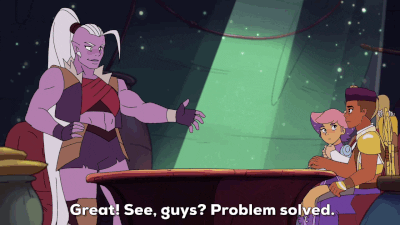
(Interestingly, the episode cuts straight from this moment to the obviously autistic Entrapta going against her own friend's advice and refusing to give up on the portal machine despite the obvious warning sign of Hordak’s violent dismissal. Parallels, much?)
Her difficulty understanding other points of view
A lot of Adora’s conflict with Catra is predicated on misunderstandings, and she has a hard time understanding the effects her actions have on other people, Catra in particular. For instance, she misunderstands Catra talking about ruling the Horde together as being purely about power, while Catra’s actual goals are safety and Adora’s companionship. That miscommunication is not just Adora’s fault, but it illustrates that she has difficulty understanding other people’s needs and motives without being explicitly told.
This isn’t just a problem with Catra, either. In general Adora has a difficult time understanding other’s motives and feelings. For instance, she doesn’t understand Glimmer’s insecurity over Bow’s friendship with Perfuma at Princess Prom, and she can’t fathom why Entrapta would choose to work for an evil faction, going so far as to assume she must have been brainwashed into it. This is because, just like with Catra, she doesn’t understand that some people’s priorities are not the same as hers.
Autistic kids tend to reach developmental milestones at different times than neurotypicals, sometimes being way ahead and other times falling behind. One such marker that is usually slower to develop and often stays impaired is theory of mind, our ability to a) understand that other people have different perspectives and b) understand those perspectives. Adora’s difficulties being able to put herself in someone else’s shoes definitely lines up with this symptom.
She’s clumsy
For someone so athletic, Adora sure lacks coordination. This is a commonly cited symptom of people with Asperger’s, though it shows up in people with other forms of ASD too. In general, autistic people often have difficulty with fine and/or gross motor skills, and this can lead to being accident and injury prone. According to Catra in 3x05, Adora bumps her head a lot. That may have just been a callback to 1x01, but either way clumsiness has been part of her characterization since the beginning, one of her many loveable, adorkable qualities.
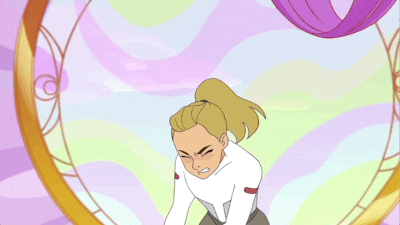
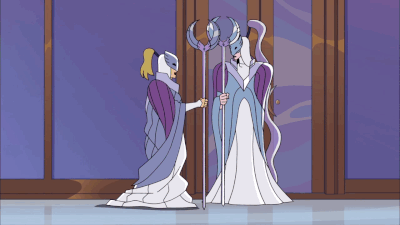
Her lack of social and self awareness
Adora can be painfully oblivious to her own inappropriate behavior. There’s several examples of this throughout the series, one of the more costly ones coming at Princess Prom. Shocked by Frosta’s youth, Adora fails to register how maybe this (in front of Frosta, with all eyes on her) is not the time to remark on it. She immediately realizes this was the wrong thing to say (or at least not something she should shout), but that small delay causes both her and Glimmer a lot of embarrassment.
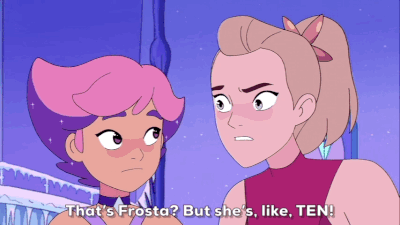
Part of the issue here is that she loses control of her volume, which in itself is a common problem for those of us on the spectrum. This isn’t the only time we see her have this problem, either, and it’s amplified (tee hee) when she’s drunk/infected.
More generally, one of the funniest examples of Adora’s poor social awareness comes when she barges into Huntara’s flirtation with the bartender in the Crimson Waste. She’s so focused on her task of recruiting Huntara that it doesn’t even occur to her that this is an intimate moment and intruding would be rude.
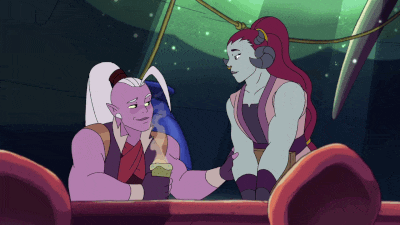
In the Rebel Princess Guide Adora also says she wishes Queen Angella would let her make some adjustments to the uniforms of the Bright Moon guards, which implies she tried to make these suggestions already. Maybe she figured She-Ra could suggest anything, but as both a newcomer and a royal subject that’s a bit of a faux pas. Chances are, that went right over Adora’s head.
She can’t read a room to save her life (literally)
This is another, more specific aspect of social awareness. Adora has difficulty picking up on the implicit rules (social norms) when she enters unfamiliar situations, and has a tendency to step on toes because of it. She also doesn’t understand when her friends try to nonverbally communicate what she’s doing wrong, and nonverbal communication deficits and problems with social awareness and insight are two major symptoms of ASD. One specifically listed example is “difficulties adjusting behavior to suit social contexts”, including:
Lack of response to contextual cues (e.g. social cues from others indicating a change in behavior is implicitly requested)
Unaware of social conventions/appropriate social behavior; asks socially inappropriate questions or makes socially inappropriate statements
Here’s a couple specific example of times where Adora misses or misunderstands nonverbal cues to change her behavior:
At her first Rebellion meeting she doesn’t realize that maybe she shouldn’t sit in the special-looking chair, and doesn’t clue in that that’s why everyone is freaking out.
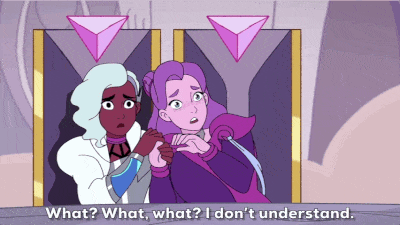
In the Crimson Waste, Glimmer responds to the growling bar patrons surrounding them by suggesting that maybe these aren’t the kind of people they should be asking for help, but Adora persists. She jumps up on the bar and makes a speech trying to get directions (which is socially inappropriate for the context as well as dangerous), somehow missing all the scowls from the patrons as well as Bow and Glimmer’s wild gesturing.
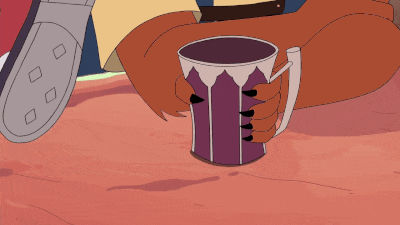
Panic over unfamiliar social situations
Adora’s anxiety about going to Princess Prom could be attributed to many things, not just a spectrum disorder. Her obvious anxiety, for one, though to be fair there’s a high comorbidity between the two disorders. In any case, it seems the unfamiliarity of the situation is a sticking point for Adora in particular, while Bow and Glimmer are nothing but excited for their first ball.
Adora’s anxiety seems to stem mostly from being overwhelmed by the prospect of entering a new social situation with a whole bunch of unfamiliar rules to remember. She’s still learning behavioral norms outside of the Horde, and this is a huge jump up in terms of difficulty for her fledgling social skills.
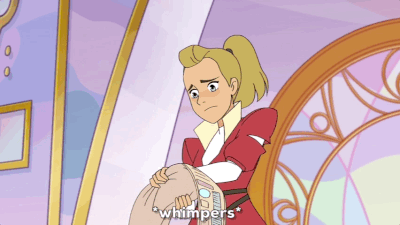
To cope with her stress she goes overboard trying to prepare by making a conspiracy board of sorts, flash cards, and an obstacle course. And at the ball itself, it seems like she’s even rehearsed how to behave.
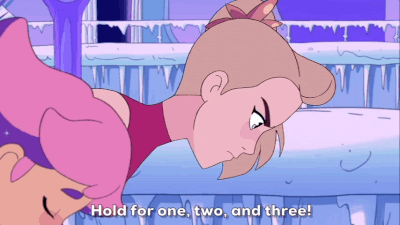
This probably isn’t only relatable to autistics, but it’s very relatable to us. Creating and rehearsing behavioral scripts is a common strategy to avoid embarrassing ourselves in public. Unfortunately, as we saw above, this works for about five seconds before Adora botches the whole thing by commenting on Frosta’s age.
Extreme stress over details
In general, Adora is a very anxious, perfectionistic person who hyperfixates on details, a very autistic trait. As mentioned above, this is wonderfully illustrated by her overpreparation for Princess Prom. She’s broken down the overwhelming list of rules in the invite into categories to make it more manageable, gone into detail categorizing people’s relationships to each other, and learned trivia about the guests in order to feel more prepared. Yet, somehow she missed the important fact that the hostess is only eleven years old.
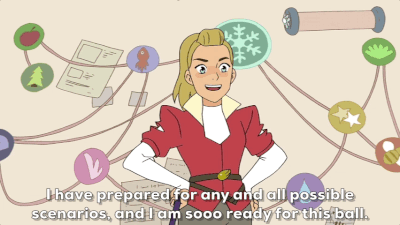
Unfortunately this hangup doen’t only affect her, but also her friends and allies. The overarching theme in “Roll With It” is how debilitating Adora’s anxiety and perfectionism can be. Her eye for detail and ability to see flaws in plans is actually very valuable, but she gets so hung up on every possible thing that could go wrong that she can’t accept imperfect solutions with calculated risks.
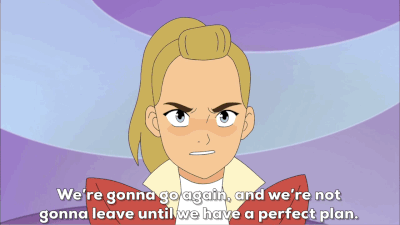
Her propensity to be overwhelmed by too much information (like with the Princess Prom invite) shows up here too. Adora grows more and more frustrated and overwhelmed as more princesses join the planning session, adding more variables to deal with and more people to manage. She begins lashing out and shooting down every possible solution that doesn’t satisfy her need for perfection immediately. Her behavior looks like it may be headed for a meltdown until it culminates in an epic rant revealing all her anxiety and how it ties into her insecurities about her own imperfection.
Thankfully her friends are able to reassure her that she has support and doesn’t have to be perfect, but it’s an ongoing battle, one we already saw her struggle with in “Flowers for She-Ra” and “The Battle of Bright Moon”. It’s a strong tenet of Adora’s personality that is proving difficult to shake.
What she misses about the Horde
The recently published Rebel Princess Guide contains a list by Adora of things she misses about the Horde, and this list screams neurodivergent. I’ll go through it point by point, since there’s a lot to unpack here.
THINGS I MISS ABOUT THE HORDE
1. I miss the rigid schedule. It never changed, and I always knew what to expect.
Ritualistic behavior and an insistence on sameness are often seen in individuals with ASD. In fact, it’s a major symptom. Many of us have diifficulty adjusting to changing schedules, changes in diet, or even minor changes in our environment (such as placement of objects, boy do I have stories there). We need warning when things are going to change, and even if we know it’s coming it’s still a struggle to adjust.
2. I miss the constant sound of machines and whirring. In Bright Moon, there’s always music playing, or people laughing, and birds singing. It’s nice but it makes it hard to focus!
Autistic brains process sensory information differently from neurotypicals, that’s basically our disorder at its core. Over or under reactions to sensory input are common and in fact considered a major symptom, and this entry of Adora’s specifically refers to difficulties with sensory filtering. We have a hard time filtering out information that’s irrelevant to our current task, which makes us easily distractable.
3. Believe it or not, I miss my hard cot in the barracks. My bed in the castle is way too soft!
This ties into both the insistence on sameness and sensory issues.
4. Catra… sometimes.
This isn’t autistic, it’s just gay.
Speaking of which...
She’s gay
Adora's relationship with Catra has always been queer-coded, but any doubts about her sexuality were dispelled in season 3 by the way she fawns over Huntara like a baby gay over her gym teacher. Her obvious queerness might seem unrelated to the topic of autism, but those of us within the community can attest there’s probably just as many queer people among us as there are cishets. It’s so notable that there has been quite a bit of scientific research confirming people with ASD are more likely to be LGBT and gender atypical and exploring the cause of this link.
(This needs no proving at this point, but enjoy these gifs anyway...)
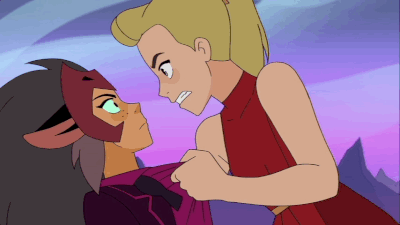
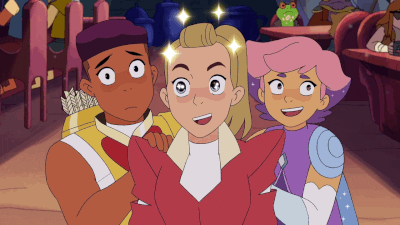
In conclusion
Overall, there’s a lot of hints and circumstantial evidence suggesting Adora could have ASD. Was this the creators’ intent? Hard to say. Adora is the protagonist and one of the most developed characters, so she’s definitely not a cardboard cutout or checklist for ASD symptoms (compare that to Entrapta, a secondary character whose behaviors can often easily be attributed to autism). It’s totally possible the creators just characterized her as naive and awkward and obsessive without realizing the implications of that cluster of traits together.
Regardless of authorial intent, it’s perfectly valid to look at Adora and see representation of the ASD community. The groundwork is there. And if someone else looks and doesn’t see it, or sees something else causing this behavior, that is also fair. No one is forcing anyone to accept this headcanon (or at least they shouldn’t be), but in return please don’t disparage it. Even if she is not autistic Adora is definitely autistic-coded, and we could use some more heros with the disorder, given how we’re mostly relegated to being villains and anti-heroes (not that there’s anything wrong with us filling those roles sometimes, but a little variety would be nice).
Adora is often referred to as a dumbass, but she’s actually quite intelligent, just sometimes slow to understand how she should act and how people feel. Still, she tries her hardest, just as she does with everything else. Adora is heroic and compassionate, even if she sometimes struggles to understand others. When autistic-coded characters are so commonly portrayed as cold and unforgiving, Adora is a sorely needed exception.
1K notes
·
View notes
Note
Hey! I was wondering if you had any tips for handling executive function issues? The post about everything being geared towards dealing with children is too real...
Honestly yeah I feel that, it sucks to be dx’d as an adult and have to deal with all the resources being geared towards kids. The thing about ADHD brains (and some other neurodivergent brains too) is that they’re reward-system driven. In my experience it’s really hard to do something if there’s no immediate reward for doing the thing, or no immediate consequences for not doing it. So once you know that, you can figure out how to hack your brain into doing what you want it to do.
Here’s how to do the thing:
My first suggestion for when you need to get something done but your brain is like no absolutely not, is to give yourself some sort of external motivation. What works for you wont necessarily work for others. Like that thing where when you read a page of a textbook and can then eat a piece of candy or something really doesn’t work for me because I don’t have the self control to not just eat all that candy now. After all my classes for the day are over I go to the library, and I tell myself that I can’t go home until I finish my reading. This one works really well for me because I want nothing more than to get right into my bed, and I know I won’t do any homework once I get home, so I feel guilty if I consider leaving before what I need to get done isn’t done. Find yourself an external reward.
Another idea is is instead of a reward, give yourself a more immediate consequence. Your essay isn’t due for a week and you want to start it now but your brain says no? Make a plan for what you want to get done, and have a friend hold you accountable. I’d way rather do the thing and make my friend proud of me rather than potentially disappointing them. I like working at the library with friends because the social expectation is that you’re doing homework, so breaking that expectation is enough of a consequence for me. Sometimes I’ll call my mom and tell her what I have to get done and have her check in on me in half an hour to check on my progress. I’m used to disappointing my mom so this one doesn’t work as well for me- less perceived consequences for not doing the thing. There don’t have to be any real consequences, just perceived consequences. Nobody actually cares if they see someone watching Netflix in the library.
Other tips that aren’t ‘how to do the thing’:
Time management: I set alarms for everything. Have to leave the house in 10 minutes? Alarm. Time to go to bed? Alarm. They’re an easy way to bring your attention to what time it is or to remind you to do a specific thing at a specific time. Use the labels for the alarm to remind you exactly what it is you need to do- it doesn’t need to be a Neville with his rememberall situation. You can also set recurring alarms for multiple days a week.
Actually this is a ‘how to do the thing’: one of my friend’s calls this ‘Emma’s sitting time’, because once I sit down, it’s very hard to convince me to get back up to do something. Sitting and doing nothing > doing anything. If you’re heading home and want to do laundry and clean your room and all sorts of stuff you’re motivated to do, don’t sit down. Sitting kills all motivation, because now you’re in relax mode, and your brain wants to stay there. When you have the motivation, do the thing immediately, because you most likely wont do it later.
Organization: I was The World’s Most Disorganized Child, and that’s translated to adult me. I was always losing things, and never knew when my homework was due. I bought myself an agenda in my second year of university and it’s honestly changed my life. Buy a pretty one (mine has koalas on it) with cool coloured pens so that you actually keep using it, and be vigilant about writing everything in it to form a habit. Once you form a habit of using it, it’s the most useful thing to organize your life. (Bullet journalling was a cool idea but I kept getting frustrated and giving up on it because it took forever to set up, but it could be right for you). My personal method is to write down all the stuff that’s due that day on one side (eg homework, a meeting at this time, bills etc), and I cross them off when they’re done. The other side of the page is where I put a check box of stuff to do that day. I get so much satisfaction from checking things off, and if I don’t get to something I draw an arrow and move it to another day when I can get to it. This way you keep track of the things you have to do, but can also plan ahead say okay this thing is due Thursday so i’ll try to get to it Tuesday night. Also it helps to number the things you have to do to prioritize what you have to do. Other advice for losing or misplacing things is to leave things out somewhere you’ll see it if you need to use it again soon.
Distractions: You will get distracted by stuff, it’s part of life. The best way to avoid this is literally just to remove them. Go do your work in a quieter place, get a blacklist app on your laptop to keep you from going on tumblr. Its not easy but its really helpful to keep you on task. I audio record my lectures to make sure I stay off my phone. Do what works for you.
So this ended up being super long, but this is a lot of the tools I use to help me at school and with the rest of my life. A lot of these strategies are the reason why I went from a C average student in my first year of university to an A average student in my second and third years. This stuff works, but only if you adapt it so it works for you.
I hope this helps!
9 notes
·
View notes
Text
(Quick note - I have copied this over from my main blog - this is my content...)
ADHD, Neurodivergence, Identity…
I want to start blogging about some of my experiences with mental illness and neurodivergence. Two words, that before this year, I would never of used in relation to myself.
One of the most fascinating and somewhat crippling aspects of learning you are neurodivergent, is becoming so hyperaware of your thoughts, actions, personality, wondering what’s you and what’s your diagnosis, (or what you are imagining/projecting because of your diagnosis). I likely drive my friends mad talking or joking about it, but it’s hard to articulate the complete upheaval that learning this about yourself creates. Suddenly your entire history and personhood is re-defined. You have to change your narrative. I spent most of my teenagehood and childhood feeling removed/estranged from the people and world around me. More than feeling an ‘outcast,’ I felt myself an alien. I believed (and felt that others believed), that I was incredibly lazy and did not have the drive to puruse my passions and potential. This left such a hole in my heart and self-confidence. Imagine that you have this great love for something - or many things, but can’t even motivate yourself to take one single step toward it. You lose interest in every hobby you’ve ever taken up and you don’t understand why you can’t just do the thing. It seems easy for everyone else? What am I missing? So you compensate. Suddenly (and very briefly), you are really into note-taking and study blogs and watching countless hours of videos on how to get organised and ‘change your life’ and you imagine what kind of person you could become. Or you start every new year or semester with the goal to just stay on top of things, just remember, just write it down - everyone else does it? Why can’t you? Inevitably, that falls away.
What happens when you can’t maintain this? When suddenly those three assignments are due, you’ve dropped out of your class/hobby, you’ve missed another opportunity, avoided another goal and heard another person tell you, ‘you just need to get organised…’ ‘ you’ve got so much potential, you just need to apply yourself!’ “I don’t understand how you forgot/didn’t do the thing/didn’t write it down!”
I don’t think I can ever effectively describe the impact that this has had on me. There is something so devastating in not understanding there is something different about your brain during the really sensitive, formative years of your life. Because you end up spending so much time trying to work out why you are not like everyone else, why you struggle with things that most people find easy, why it is a constant battle to stay afloat, to have people angry with you/criticising you for something that you both feel should be in your control, but neurologically isn’t.
ADHD is so severly misunderstood. It’s invisible and it is crippling. The image of the little boy in class who can’t sit still or stop talking is such a prevalent and damaging stereotype. Before I got my diagnosis and before I even had looked into ADHD, I spent hours researching what could be wrong with me and doing online ‘tests’. These ranged from anxiety, to depression, Bipolar, PMDD and Personality Disorders, (strangely enough, ADHD often exists alongside other mental illnesses and I was diagnosed with co-morbidities…) But I think this gives a degree of context to what undiagnosed ADHD feels like, because it’s not someone who wont shut up, or sit still. To me it feels like everyone else got a manual on how to be a person and I didn’t. Often times, it’s the depressed, anxious, struggling teenager or young adult, who feels so inadequate, who feels like an alien, who can’t even trust their own passions or interests. Who is in a constant battle to meet the expectations of themselves and those around them. Who’s socially awkward or uncomfortable, who’s disocciated, who can’t follow a conversation, or instructions, who suffers in loud spaces, who struggles with small talk, strangers, shopping centres, keeping themselves and their space clean, uni work, school work, chores, family, friendships, relationships, their identity, their passions, there interests, their personality, regualating their emotions
ADHD is so exhausting, because it’s a constant battle to just meet the base line. Every thing you do from the moment you get up, til the moment you are asleep (and even then) is impacted by it.
Say you have an assignment, and a couple of chores to do on one day. Not a big deal right? Ok so you set an alarm for 8am, except your brain didn’t turn off until 4am the night before, so you get up at mid day, you go to put the washing in, but you forgot to turn on yesterdays load, so you do that first, you go to make a morning coffee, you check the time, it’s 12.30 - where did half an hour go? I just got up?! (Time-blindness). You make your coffee and drink it while checking social media, which sucks you in, because your dopamine depleted brain craves stimuli! You check the time, its 1pm, you tell yourself you’ll scroll for ten more minutes, and that ten minute excuse repeats a few times. It’s 1.30 and now your angry, because why didn’t you have the self control! (Hint: you have a disordered executive function). You put your mug on the sink, promising you’ll come back to it later. You go back to the laundry, you realise you forgot to turn the dryer on. You go to do your assignment, you clear your desk, open laptop, but now you don’t know where to start - you can’t naturally prioritise tasks, or break down the individual steps that need to be done in order to complete an assignment, you must do this with the ‘skills’ you have actively had to learn from a coach, internet etc. It’s like trying to bake a cake with no measuring cups, or recipe! So now you are looking at the assessment outline, and what you’ve worked on already, and trying to close last nights 200 tabs of hyperfixation. You read the outline 5 times without actually reading it, on the 6th you try really hard, you’re fidgeting in your chair, it’s an almost physical pain having to sit there and read it. Your eyes feel glazy, there’s too many words and they look like a big smudge on the page. You quickly check messages (dopamine hit), you come back to the outline. Its been half an hour, you still haven’t started. It’s about 2pm, you havent had lunch or breakfast. You go make a tea and come back. Maybe you need backround music? You spend another 20 minutes finding the right playlist, except its not right because it’s either too stimulating or not stimulating enough. You find another playlist, or you go down the rabbit whole of some movie soundtrack you’ve been meaning to look at. It’s 2.45. The washing! You go back and finally get yesterdays load in the dryer and start the load you meant to do today. Might as well make another tea now that I’m up. Might as well check Facebook now I’ve been interrupted. I’ll start at 3.30. 3.30 rolls around, your sibling gets home from school. Noise, talking, lunchbox rattling, bags being unpacked. Distraction. The noise is painful, your executive function (the impaired part of the ADHD brain) is also responsible for emotional regulation. Suddenly you are so fiercly angry at the noise being made in the rest of the house. It’s so over stimulating it feels like sandpaper on your brain and ears, you feel sick to your stomach with rage, you are crying, sobbing. All because people in the other room are talking. You lay on your bed trying to calm the overwhelm and increasing stress at not having done your assignment. It’s 4pm. Mum asks why you left your mug out, or didn’t do the dishes (you were too busy thinking about doing the washing!) She notes the machine still going and tells you that you wont have time to put it in the dryer tonight, you’ll have to do it tomorrow. But you need those clothes for tomorrow, you’re having breakfast with a friend. You’ll have to reschedule. You message your friend, and repeat the standard script “god I am so sorry, I’m such a mess, can we do later in the morning? I’ve got to do chores…” they can’t reschedule, you cancel. You sit back down with the assignment. You fidget. It feels like a physical pain to have to sit there and force yourself to do it. You’ll do it tomorrow. You pack up, and get ready for bed, removing the pile on your bed back to your desk. Your sheets are unmade, it’s uncomfortable and you feel agitated. You’ve forgotten to brush your teeth, or clean your face. You scroll online, or hyperfocus on a new hobby, project, idea, that wont interest you tomorrow, until 3am. You set your alarm for 8am…
This is just one small example and snapshot of ADHD and the impact of Executive Dysfunction. Here are a couple of examples/descriptions of how it feels from the ADHD subreddit.
“Schrodinger’s ADHD: Everything is interesting and boring at the same time. Every subject, every hobby.”
‘The Two ADHD Moods: I can’t do it / I can’t stop doing it. The two types of ADHD time: Now / Not Now The two ADHD memory modes: I literally can not recall the words that just came out of my mouth / I can recite the opening paragraph of every single magic tree house book.’
I also want to talk Neurodivergence, as this is another misconception when it comes to ADHD. In the way that Autism, Tourettes, Dyscalculia, Dysgraphia are all forms of neurodivergence, so is ADHD. ADHD is not a behavoural issue, but a neurobiological developmental disorder. ADHD also has many overlapping traits with Autism, (not to be confused as the same, ADHD is not on the spectrum). These include, sensory overwhelm/sensitivity, memory issues, hyperfocus/hyperfixation, interrupting conversation/trouble waiting in turn, issues reading/recognising social cues, stimming, perseveration, (getting ‘stuck’ on or repeating a thought, topic or idea, even if the conversation has moved on), and avoidance/trouble with eye contact.
To be clear, ADHD is not on the spectrum, a distinguishing feature between these neurotypes is the cause of the symptom. For example someone with ADHD may not recognise social cues due to inattention/overwhelm/impulsivity, where as someone with autism may struggle to interpret these social cues.
It is important for ADHD to be recognised as a neurotype, and not a behavoural issue. When discussing ADHD traits with a neurotypical person, the response is often along the lines of ‘well everyone is a little distracted/unmotivated/lazy/forgetful/late sometimes.’ My response to that ‘Would you say that everyone is a bit ‘socially awkward/shy’ sometimes to an autistic person? Or ‘everyone has trouble reading sometimes’ to a dyslexic person?’ I imagine the answer would be no, as it is understood that these traits are a consistent, uncontrollable and debilitating.
The more I have learnt and read about ADHD in the context of neurodivergence, the more I have tried to recognise the ways I hide or detract from my symptoms, by ‘masking’. This has included, taking on certain personas or feeding someone elses assumption about me as ‘the messy one,’ ‘the disorganised one,’ ‘the chaotic one.’ In the past I have almost embraced these stereotypes about myself, as it gave me a sense of identity, a framework with which to see and understand myself. Frustration and anger masked over-stimulation/overwhelm, I was not able to recognise the root of these feelings and I also learnt to fidget/stim in the ‘right’ way. When engaging in small talk with someone I am unfamiliar with, I often resort to mimicing or imitating how I have seen other people interact, speak etc and I am conscious of eye contact, (too much, too little?). I catch myself looking at people/staring too much and am constantly trying to gauge what the right amount is, where else to look, etc. I struggle a lot with taking turns in convesation, as I don’t always know where to interject, or I worry I will forget the thought, this has led me to just stay silent instead in conversations and present myself as serious, or elusive.
That’s really all I have to say for today. I think overall ADHD is far more complex and challenging than it is perceived to be, and these stereotypes are so harmful to people who have it and are trying to navigate not only their symptoms, but a world that is not understanding nor knowledgeable of the limitations and struggles of ADHD or neurodivergence.
I have a lot more to say on all this and will try and write more about this going forward. DM/comment etc if you have any thoughts or criticism of anything I have said. Disclaimer, I am still learning and may make mistakes regarding information, or discussing other neurotypes !
Here are some links you might want to check out if you have/think you have ADHD or you have a friend or family member with ADHD. I also highly, highly recommend the ADHD subreddit!
ADHD explained simply:
https://www.additudemag.com/what-is-adhd-symptoms-causes-treatments/
“ADHD is a developmental impairment of the brain’s executive functions. People with ADHD have trouble with impulse-control, focusing, and organization.
“’Attention deficit’ is, some experts assert, a misleading name. “Attention deregulation” might be a more accurate description since most people with ADHD have more than enough attention — they just can’t harness it in the right direction at the right time with any consistency.”
Comorbidities https://adhd-institute.com/burden-of-adhd/epidemiology/comorbidities/ “The majority of adults with ADHD have a diagnosed or undiagnosed comorbid psychiatric disorder, which can complicate diagnosis and treatment of ADHD.1-3“ ADHD and Autism https://www.spectrumnews.org/features/deep-dive/decoding-overlap-autism-adhd/ “A growing number of genetic studies support the notion of at least some shared causation between autism and ADHD. But imaging studies comparing brain structures and connectivity have yielded a confusing mix of similarities and differences. And some behavioral research has highlighted the possibility that outwardly similar features mask distinct underlying mechanisms. Inattention in a person with autism, for example, might result from sensory overload, and apparent social problems in someone with ADHD may reflect impulsivity. Perseveration https://www.understood.org/en/friends-feelings/common-challenges/self-control/perseveration-adhd-and-learning-differences
“(Kids) who perseverate often say the same thing or behave in the same way over and over again. And they do it past the point where it makes sense or will change anything. It’s like they’re stuck in a loop that they can’t get out of.”
ADHD and social skills https://chadd.org/for-adults/relationships-social-skills/#:~:text=Social%20Skills%20in%20Adults%20with,their%20inattention%2C%20impulsivity%20and%20hyperactivity.
“Social skills are generally acquired through incidental learning: watching people, copying the behavior of others, practicing, and getting feedback. Most people start this process during early childhood. Social skills are practiced and honed by “playing grown-up” and through other childhood activities. The finer points of social interactions are sharpened by observation and peer feedback.
Children with ADHD often miss these details. They may pick up bits and pieces of what is appropriate but lack an overall view of social expectations. Unfortunately, as adults, they often realize “something” is missing but are never quite sure what that “something” may be.”
ADHD and stimming https://www.betterhelp.com/advice/adhd/repetitive-behaviors-in-children-with-adhd-stimming-fidgeting-and-what-these-actions-may-mean/
“Many believe that stimming and fidgeting is reserved for those on the autism spectrum. However, it is now known that children with ADHD are just as likely to use repetitive body movements to self-stimulate. In fact, autistic stimming and non-autistic stimming are different. The main difference is that those with ADHD typically only use stimming for a short period of time while they are trying to concentrate. For example, someone with ADHD may stim for under an hour while those with autism will stim for several hours at a time. While stimming and fidgeting are typically seen as tapping or rocking, there are many other things that children with ADHD do to self-stimulate. There are actually five different variations of stimming, which include olfactory, vestibular, visual, tactile, and auditory.”
0 notes